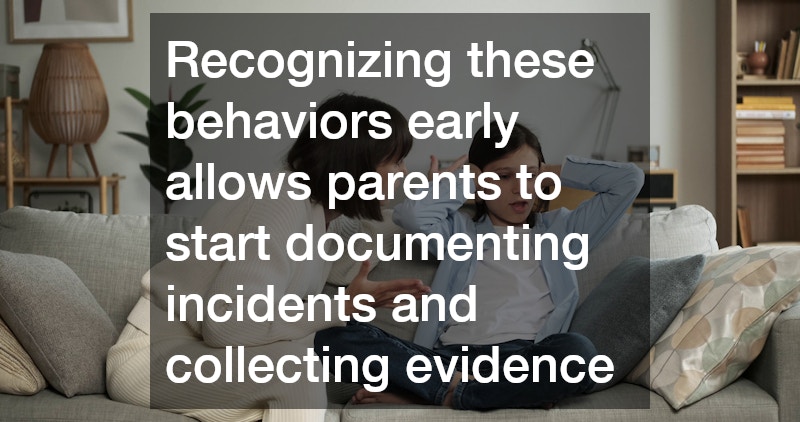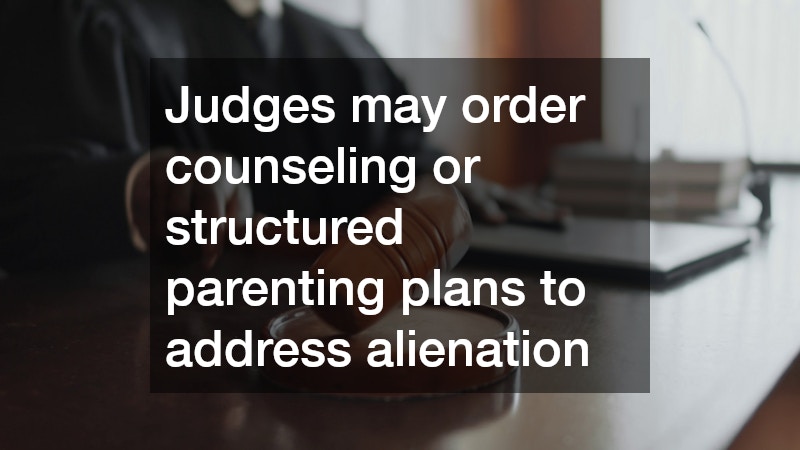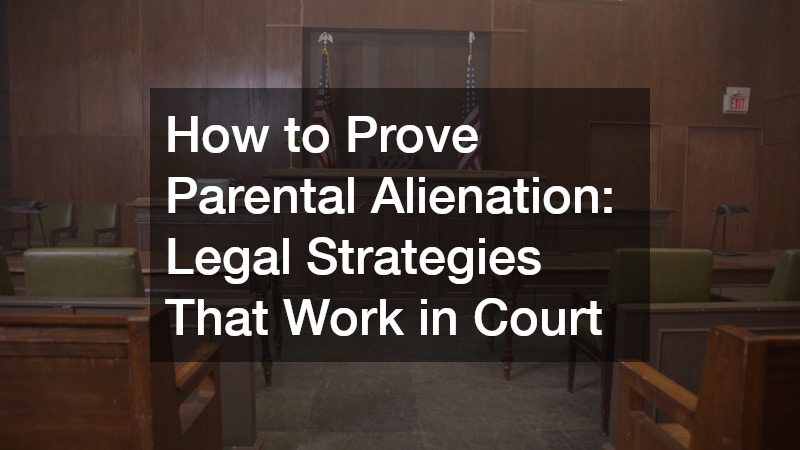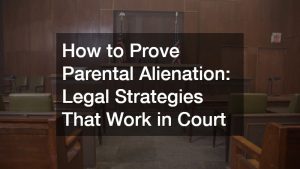- Parental alienation has serious emotional consequences: Courts recognize that alienation can lead to anxiety, depression, low self-esteem, and trust issues in children.
- Identify and document signs early: Sudden hostility, anxiety, negative repetition, excessive loyalty, and behavioral changes are key indicators of alienation.
- Maintain thorough documentation: Keep communication logs, journals, school and medical records, and witness statements to demonstrate consistent patterns of alienating behavior.
- Leverage professional evaluations: Child psychologists, custody evaluators, and social workers provide objective assessments and expert testimony that strengthen your case.
- Present evidence strategically in court: Organize documentation, create timelines, avoid emotional appeals, and use expert testimony to show patterns rather than isolated incidents.
- Understand legal tools and custody implications: Court orders, mediation, custody modifications, psychological evaluations, and supervised visitation can support your claims and protect the child’s best interests.
- Prioritize the child’s relationship and well-being: Communicate positively, avoid criticizing the other parent, and focus on the child’s emotional health to maintain credibility and strengthen your case.
Parental alienation is a growing concern in family law cases. When one parent actively or subtly undermines a child’s relationship with the other parent, it can have long-lasting emotional consequences. In custody disputes, proving parental alienation is essential to safeguard both your parental rights and the child’s well-being. This article explores detailed, actionable strategies to establish parental alienation in court and provides guidance on navigating legal and emotional complexities.
What Is Parental Alienation and Why Does It Matter?
Parental alienation occurs when one parent manipulates a child to reject, fear, or show hostility toward the other parent without legitimate justification. Alienation can be intentional or subtle and can manifest in various ways:
- Making negative statements about the other parent in front of the child
- Restricting or limiting visitation or communication
- Encouraging the child to align with one parent’s perspective in disputes
- Using the child as a messenger to convey negative information or complaints
Courts increasingly recognize the harmful effects of parental alienation on children’s mental health and development. Children who experience alienation often show signs of anxiety, depression, low self-esteem, and difficulty forming trusting relationships. Understanding how to prove parental alienation is not just about winning custody—it’s about protecting the child from emotional harm and ensuring they maintain a meaningful relationship with both parents.
What Are the Signs of Parental Alienation?

Identifying the signs of parental alienation is the first step toward documenting and proving it in court. Some common signs include:
- Sudden hostility toward the alienated parent: Children may suddenly refuse to see a parent or express fear without clear reasons.
- Unexplained anxiety or guilt: The child may feel guilty or anxious about spending time with the alienated parent.
- Negative repetition: Children often repeat negative statements made by the alienating parent, which can indicate influence rather than independent thought.
- Excessive loyalty or dependence on the alienating parent: This can manifest as resistance to contact with the other parent, extreme favoritism, or reluctance to discuss the alienated parent.
- Behavioral changes: School problems, social withdrawal, or emotional outbursts can sometimes indicate alienation.
Recognizing these behaviors early allows parents to start documenting incidents and collecting evidence while seeking professional support for the child.
How Can Documentation Support Your Case?
Documentation is one of the most powerful tools in proving parental alienation. Courts rely heavily on objective evidence rather than anecdotal claims. Effective documentation demonstrates consistent patterns of alienating behavior over time.
What Types of Documentation Are Useful?
- Communication logs: Record texts, emails, and social media messages that show interference or disparaging remarks about you.
- Journals or diaries: Maintain a detailed timeline of events, including dates, times, and descriptions of incidents. Focus on facts rather than opinions.
- School and medical records: Teachers, counselors, or pediatricians may observe changes in behavior, academic performance, or emotional well-being.
- Witness statements: Collect statements from extended family, babysitters, teachers, or other adults who observe interactions between the child and the alienating parent.
Tips for Maintaining Documentation
- Be consistent and factual: Document incidents as soon as they occur.
- Avoid emotional language: Stick to observable behaviors and statements.
- Preserve digital evidence: Take screenshots of online communications and back them up securely.
- Include context: Note relevant circumstances, such as holidays, school events, or custody exchanges.
Proper documentation creates a strong foundation for your case and supports expert assessments and testimony.
How Can Professionals Help Prove Parental Alienation?
Expert evaluations are highly persuasive in court. Professionals provide objective evidence that courts value more than personal claims.
Child Psychologists and Therapists
- Evaluate the child’s emotional and psychological well-being
- Identify patterns of manipulation or undue influence by the alienating parent
- Provide written reports and expert testimony in court
- Recommend therapeutic strategies to help the child process conflicting emotions
Custody Evaluators and Social Workers
- Observe interactions between the child and both parents
- Assess whether alienation is negatively affecting the child’s development
- Provide detailed reports for judges outlining behaviors, communication patterns, and potential interventions
Legal Experts
- Family law attorneys can guide evidence collection, ensuring it complies with court standards
- Attorneys help present evidence strategically to strengthen your case
- Legal professionals can anticipate counterclaims and prepare rebuttals
Professional assessments lend credibility to claims of parental alienation and help courts understand the impact on the child.
How to Present Evidence Effectively in Court
Presenting evidence strategically is crucial for proving parental alienation. Courts favor organized, objective, and credible evidence that demonstrates a clear pattern of behavior.
Organize Your Case
- Group documentation by type (communications, observations, professional reports)
- Create a detailed timeline of alienating incidents
- Highlight repeated patterns rather than isolated events, showing consistency over time
Avoid Common Pitfalls
- Never attempt to manipulate the child to testify against the other parent
- Avoid emotional pleas; rely on documented evidence and professional assessments
- Ensure all evidence is verifiable and collected ethically
Use Expert Testimony Wisely
- Experts should explain how alienation affects the child’s emotional and psychological health
- Ensure expert testimony is supported by observations, reports, and behavioral patterns
- Experts can also recommend custody arrangements or therapeutic interventions to the court
Can Parental Alienation Affect Custody Decisions?

Parental alienation is increasingly considered in custody and visitation decisions. Courts may use evidence of alienation to make determinations that protect the child’s emotional well-being.
Potential Impacts on Custody
- Primary Custody: Courts may adjust primary custody arrangements to ensure the child maintains a healthy relationship with both parents.
- Visitation Rights: Restrictive visitation or supervised parenting time may be modified to prevent further alienation.
- Therapeutic Interventions: Judges may order counseling or structured parenting plans to address alienation and restore parent-child bonds.
Courts prioritize the child’s best interests and aim to minimize emotional harm caused by parental conflict.
How to Handle False Allegations or Counterclaims
In contentious custody cases, the other parent may deny alienation or claim you are alienating the child. Handling counterclaims requires careful strategy.
- Maintain objective records of all interactions
- Avoid retaliatory behavior or engaging in disputes in front of the child
- Present expert assessments to support your claims
- Focus arguments on the child’s best interests, rather than personal grievances
Careful preparation and professional guidance are critical to addressing false allegations effectively.
What Legal Tools Can Support Your Case?
Several legal tools can strengthen your position when proving parental alienation.
- Court Orders: Specific visitation and communication arrangements can help reduce opportunities for alienation.
- Mediation: Documenting attempts at mediation shows the court your willingness to resolve disputes amicably.
- Motion for Custody Modification: If alienation continues, a formal request to adjust custody may be necessary.
- Psychological Evaluations: Court-ordered evaluations by child psychologists or custody experts provide objective evidence of alienation.
- Supervised Visitation: Courts may impose supervision to protect the child and monitor interactions.
Using these tools strategically demonstrates that you are acting in the child’s best interests and following legal processes.
How to Communicate With Your Child Without Fueling Alienation
Maintaining a strong parent-child relationship while proving alienation requires balance. Avoid behaviors that could be perceived as manipulative.
- Keep conversations positive and age-appropriate
- Avoid criticizing the other parent in the child’s presence
- Encourage the child to express feelings openly
- Reassure the child that it is normal to love and spend time with both parents
- Focus on shared experiences, routines, and bonding opportunities
Maintaining a healthy relationship with your child strengthens your credibility and demonstrates to the court your commitment to their well-being.
What Are the Challenges in Proving Parental Alienation?
Proving parental alienation is inherently complex. Some challenges include:
- Subjectivity: Children’s behaviors and emotions can be interpreted in different ways.
- Distinguishing legitimate concerns: Not every instance of rejection is alienation; some may reflect genuine safety concerns.
- Resistance from courts: Family courts may be cautious in intervening in family dynamics without strong evidence.
- Counterclaims: The other parent may accuse you of alienation, complicating the narrative.
Successfully navigating these challenges requires careful documentation, professional support, and adherence to legal protocols.
How Long Does It Take to Prove Parental Alienation in Court?
The timeline for proving parental alienation varies depending on the complexity of the case and court procedures. Factors include:
- Volume of documented incidents
- Availability of expert evaluations
- Cooperation of witnesses, schools, and therapists
- Court schedules and procedural requirements
While the process may take months or even years, a well-prepared case with strong evidence improves the likelihood of a favorable outcome.
How to Prove Parental Alienation: Tips for Parents Pursuing Legal Action
- Begin documenting alienation as early as possible
- Consult a family law attorney experienced with parental alienation cases
- Work with psychologists, therapists, and custody evaluators
- Maintain objective, factual records
- Focus on your child’s emotional health rather than personal disputes
- Avoid actions that could be perceived as retaliatory
These steps not only strengthen your case but also show the court that your primary concern is the child’s well-being.
The Bottom Line
Proving parental alienation requires careful planning, thorough documentation, expert evaluation, and a strategic legal approach. Courts prioritize the child’s best interests and increasingly recognize the harmful effects of alienation. By using these strategies, parents can effectively demonstrate alienating behaviors and protect the child’s emotional health.
A strong case is not about winning against the other parent but about ensuring the child maintains meaningful relationships with both parents. With preparation, patience, and professional guidance, proving parental alienation in court becomes a structured and achievable process.






